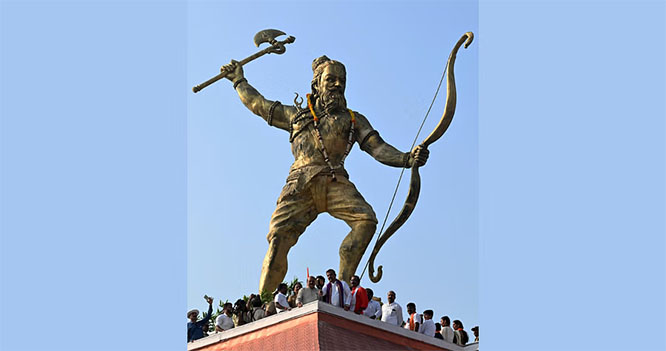
New Delhi, May 11: In the wake of the Supreme Court order staying the registration of FIRs, ongoing probes and coercive measures under the sedition law, all eyes will be on the fate of several high-profile cases registered under the draconian British-era law.
According to a National Crime Records Bureau (NCRB) report, a total of 356 cases of sedition -- as defined under section 124A of the IPC -- were registered and 548 people arrested between 2015 and 2020, out of which only six were convicted.
A 21-year-old Bengaluru-based environment activist, Disha Ravi, was arrested by the Delhi Police on February 14, 2021 for allegedly creating and disseminating a "toolkit" on the farmers' protests against farm laws brought by the BJP government at the Centre.
The toolkit was tweeted by Swedish environment activist Greta Thunberg on February 3, 2021.
The Delhi Police registered an FIR against Ravi, who was working at a vegan store in Bengaluru and fighting for environment issues since her student days, under IPC sections 124A (sedition), 120-B (criminal conspiracy) and 153A (promoting enmity between different groups).
Ravi was granted bail on February 23, 2021 by a Delhi court, which stated that "the offence of sedition cannot be invoked to minister to the wounded vanity of the governments".
Additional sessions judge Dharmender Rana said citizens are "conscience keepers" of the government in any democratic nation, and they cannot be put behind the bars simply because they choose to disagree with State policies.
In 2016, a group of students from the prestigious Jawaharlal Nehru University had held a poetry session to mark the third anniversary of the hanging of 2001 Parliament attack case convict Afzal Guru. The Delhi Police later charged the then JNU student union president Kanhaiya Kumar, along with other students and union leaders, including Umar Khalid and Anirban Bhattacharya, under section 124A and other provisions of the Indian Penal Code (IPC).
Three Kashmiri students, who were enrolled in the RBS Engineering College, Agra under the PM Special Scholarship Scheme for the students of Jammu and Kashmir, were arrested on October 28 last year for allegedly posting a WhatsApp status praising Pakistani players after their victory against India in a T20 cricket match.
They were languishing in prison till April 26 this year even after securing bail on March 30 from the Allahabad High Court due to the non-availability of local guarantors, a high-security amount and police verification.
Some noted journalists like late Vinod Dua had to face the wrath of the draconian law for views expressed by them on social media.
Dua, in his programme on Youtube on March 30, 2020, made remarks against the government's handling of the Covid crisis, following which an FIR was registered against him by the Himachal Pradesh Police under the sedition law and other charges on a complaint by a BJP leader in Shimla.
The sedition charges were quashed by the Supreme Court which held that journalists are entitled to protection in sedition cases so long as they do not incite people to violence against the government established by law or with the intention of creating public disorder.
Kerala-based journalist Siddique Kappan was arrested by the Uttar Pradesh Police while he was on his way to report the rape case of a Dalit woman in Hathras on October 5, 2020.
The FIR against him claimed that he was going to Hathras with the intention "to breach the peace" as part of a "conspiracy".
The Special Task Force of Uttar Pradesh, in its charge sheet filed in April last year, charged eight people linked to the Popular Front of India, including its students' wing leader K A Rauf Sherif and Kappan, for sedition, criminal conspiracy, funding of terror activities and other offences.
Booker Prize winner writer and activist Arundhati Roy was booked under the sedition law, along with Hurriyat leader Late Syed Ali Shah Geelani and others, in 2010 for their alleged "anti-India" speech at a seminar.
Roy and others were charged under sections 124A, 153A (promoting enmity between classes), 153B (imputations, assertions prejudicial to national integration), 504 (insult intended to provoke breach of peace) and 505 (false statement, rumour circulated with intent to cause mutiny or offence against public peace.
Student leader from JNU and IIT passout Sharjeel Imam is facing charges under the sedition law for making alleged inflammatory speeches during the protests against the Citizenship Amendment Act (CAA) and the National Register of Citizens (NRC) in 2019.
A court has framed charges against Imam, who is in judicial custody since 2020, under sections 124A, 153A (promoting enmity between different groups on grounds of religion), 153B (imputations, assertions prejudicial to national integration), 505 (statements conducing to public mischief) of the IPC, and section 13 (punishment for unlawful activities) of the Unlawful Activities (Prevention) Activities (UAPA).
As per the prosecution, Imam had allegedly made speeches at Jamia Millia Islamia on December 13, 2019, and at Aligarh Muslim University on December 16, 2019, where he threatened to cut off Assam and the rest of the northeast from India. In his defence, Imam had earlier told the court that he is not a terrorist and his prosecution is a whip of a monarch rather than a government established by law.








Comments
Add new comment